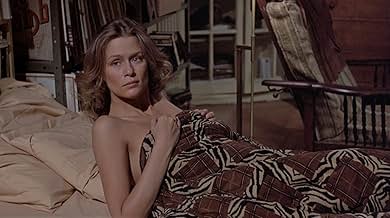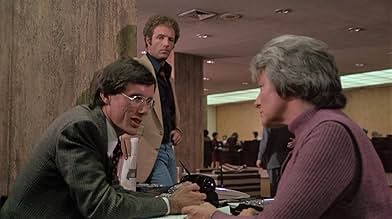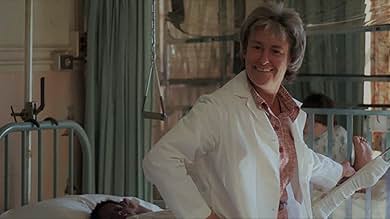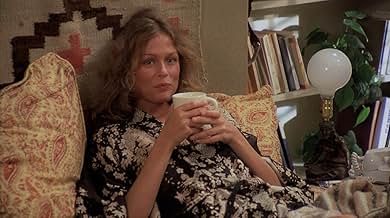Literature professor Axel Freed is a gambling addict. When he has lost his money, he borrows from his girlfriend Billie, then his mother Naomi, and finally some criminals that chase him. Des... Read allLiterature professor Axel Freed is a gambling addict. When he has lost his money, he borrows from his girlfriend Billie, then his mother Naomi, and finally some criminals that chase him. Despite all of this, he cannot stop gambling.Literature professor Axel Freed is a gambling addict. When he has lost his money, he borrows from his girlfriend Billie, then his mother Naomi, and finally some criminals that chase him. Despite all of this, he cannot stop gambling.
- Awards
- 1 nomination total
- Director
- Writer
- All cast & crew
- Production, box office & more at IMDbPro
Featured reviews
Just about everyone who has posted a reply about the shocking ending was simply left too much in the dark to realize that it tied together a different root demise of Axel Freed than gambling.
Just as a compulsive behavior leads to compulsive gambling, the root evil of Axel Freed was that he had a masochist behavior. When you look a little closer at all the scenes where he acts out this kind of behavior, it makes more sense. The problem lies in that the casual observer is only looking at the problem gambling aspect. There is more to this guy than just that.
The ways he handles his relationships with his mother, girlfriend, grandfather and feelings at the end towards the basketball player ALL indicate there is masochist behavior involved. These are more than just selfish acts. There is some actual self hatred going on as well. Without giving away the final scene, this scene further accentuates the point by sending himself into that situation. The final scene was a conscious act, not something resulting from random chance or risk.
So despite the movie having some gambling theme to it, this really wasn't necessarily about gambling addiction. It was about the nature of Axel Freed. If the movie had no gambling scenes in it at all this point would be more readily identifiable.
The only real oddity in the final scene is the placement of the final scene. If this scene was placed somewhere in the middle of the movie, the underlying theme of his masochist pattern of behavior would have been more easily identified with. Because the movie started with a gambling scene, we all assumed it was just about gambling. Wrong!
Its a tricky concept to catch the first time. Watch this movie again with this concept in mind and the movie will make more sense.
Just as a compulsive behavior leads to compulsive gambling, the root evil of Axel Freed was that he had a masochist behavior. When you look a little closer at all the scenes where he acts out this kind of behavior, it makes more sense. The problem lies in that the casual observer is only looking at the problem gambling aspect. There is more to this guy than just that.
The ways he handles his relationships with his mother, girlfriend, grandfather and feelings at the end towards the basketball player ALL indicate there is masochist behavior involved. These are more than just selfish acts. There is some actual self hatred going on as well. Without giving away the final scene, this scene further accentuates the point by sending himself into that situation. The final scene was a conscious act, not something resulting from random chance or risk.
So despite the movie having some gambling theme to it, this really wasn't necessarily about gambling addiction. It was about the nature of Axel Freed. If the movie had no gambling scenes in it at all this point would be more readily identifiable.
The only real oddity in the final scene is the placement of the final scene. If this scene was placed somewhere in the middle of the movie, the underlying theme of his masochist pattern of behavior would have been more easily identified with. Because the movie started with a gambling scene, we all assumed it was just about gambling. Wrong!
Its a tricky concept to catch the first time. Watch this movie again with this concept in mind and the movie will make more sense.
This is a film that must be seen to be believed.
Caan is extraordinary; the emotional truth of this film penetrates each line, each scene...The most searing and intense and exact ending in modern film. The straight-forward telling of a professor with a gambling problem does not prepare one for the scale and price of betrayal and redemption of human emtions that are portrayed. A stunning film.
Caan is extraordinary; the emotional truth of this film penetrates each line, each scene...The most searing and intense and exact ending in modern film. The straight-forward telling of a professor with a gambling problem does not prepare one for the scale and price of betrayal and redemption of human emtions that are portrayed. A stunning film.
I grew up amongst gamblers, spending much of my time hustling bowling and gin rummy throughout the Midwest, until, at 17, I shuffled off to the Ivy-covered walls of a prestigious Eastern College.
This gives me much simpatico with Axel Freed, the central character and portrait of self-destruction, the gambler, and James Toback, the film's author. Toback's own reflections suggest that Axel is in many ways auto-biographical.
As a film, The Gambler is shortsighted, an ambitious but nonetheless failed attempt by a first-time screenwriter in difficult waters. It is not without its brilliance-its relentless dedication toward conveying that any gambler's true goal is not success, but utter humiliation-destruction of one's self, and anything and anyone around him. It can be no other way.
In the 1990's where independent film has achieved an emergence and respect in its own, a film like this might have found the strength among the very talented people involved, (Toback, James Caan, Karel Reisz) to emerge into a true gem. Alas this 70's neglected studio cast-off didn't have that opportunity.
London Lee is great in support, Paul Sorvino and Burt Young are well cast as Freed's mob-ties. Young's performance as a mob leg-breaker includes quite a raw, and shocking collection scene.
Probably a pass for any but the gambling addict, for them, a head (as in tape-head) burner. For those who are intrigued by Toback's intelligent approach to the seedier side, try his next effort, Fingers (1978), a diamond in the rough.
This gives me much simpatico with Axel Freed, the central character and portrait of self-destruction, the gambler, and James Toback, the film's author. Toback's own reflections suggest that Axel is in many ways auto-biographical.
As a film, The Gambler is shortsighted, an ambitious but nonetheless failed attempt by a first-time screenwriter in difficult waters. It is not without its brilliance-its relentless dedication toward conveying that any gambler's true goal is not success, but utter humiliation-destruction of one's self, and anything and anyone around him. It can be no other way.
In the 1990's where independent film has achieved an emergence and respect in its own, a film like this might have found the strength among the very talented people involved, (Toback, James Caan, Karel Reisz) to emerge into a true gem. Alas this 70's neglected studio cast-off didn't have that opportunity.
London Lee is great in support, Paul Sorvino and Burt Young are well cast as Freed's mob-ties. Young's performance as a mob leg-breaker includes quite a raw, and shocking collection scene.
Probably a pass for any but the gambling addict, for them, a head (as in tape-head) burner. For those who are intrigued by Toback's intelligent approach to the seedier side, try his next effort, Fingers (1978), a diamond in the rough.
From the first scene to the last I was on the edge of my seat. Bet after bet my stomach turned. Caan's Axel Freed is driven to hit the big one, but it never seems to come or be enough. He loves the thrill of losing and feels safe when he is at the bottom.
Watching Freed bet tens of thousands of dollars on whims is excruciating. This film is one huge car wreck that you can't turn away from. With each scene the damage gets worse and worse.
"If all my bets were safe they just wouldn't have any juice," he tells his bookie.
Axel is never happy--even when he is doing the thing he enjoys most. You can see the underlying dissatisfaction he has with his job, his life, and the universe in general. The only constant in his existence is the bet. Win or lose.
Freed is very adept at evading the lowlifes he owes his shirt to. It is a joyride for him to constantly "dodge the bullet". That is why each bet becomes riskier and riskier. He wants to see what will happen to him when all of his luck runs out.
At one point in the film Axel reads a passage from an essay on George Washington to his class. He and his students conclude that Washington was afraid of failure and that he tried to remove the element of risk from everything he did. It is the very antithesis of Axel's life as a gambler. He creates situations that are totally immersed in risk believing that it is the only way to ensure true success. All or nothing. He is willing to compromise not only himself, but anyone around him who cares about him. By displaying his dark, self-destructive side he gambles with their feelings and challenges them to either love him or leave him.
It was a special treat to see two actors (Cann and Sorvino) who are in two of the best crime movies ever made (The Godfather and Goodfellas) together in the same film.
Also Antonio Vargas is appropriately slimy as the Pimp (sort of an R-rated Huggy Bear).
There are some pivotal moments in the film like when Axel is told that he must get one of his basketball-playing students to fix a game; or when he confronts his millionaire grandfather after learning that he refused to cover his debt.
I won't give away the ending, but the payoff is not what you would expect in American cinema.
Watching Freed bet tens of thousands of dollars on whims is excruciating. This film is one huge car wreck that you can't turn away from. With each scene the damage gets worse and worse.
"If all my bets were safe they just wouldn't have any juice," he tells his bookie.
Axel is never happy--even when he is doing the thing he enjoys most. You can see the underlying dissatisfaction he has with his job, his life, and the universe in general. The only constant in his existence is the bet. Win or lose.
Freed is very adept at evading the lowlifes he owes his shirt to. It is a joyride for him to constantly "dodge the bullet". That is why each bet becomes riskier and riskier. He wants to see what will happen to him when all of his luck runs out.
At one point in the film Axel reads a passage from an essay on George Washington to his class. He and his students conclude that Washington was afraid of failure and that he tried to remove the element of risk from everything he did. It is the very antithesis of Axel's life as a gambler. He creates situations that are totally immersed in risk believing that it is the only way to ensure true success. All or nothing. He is willing to compromise not only himself, but anyone around him who cares about him. By displaying his dark, self-destructive side he gambles with their feelings and challenges them to either love him or leave him.
It was a special treat to see two actors (Cann and Sorvino) who are in two of the best crime movies ever made (The Godfather and Goodfellas) together in the same film.
Also Antonio Vargas is appropriately slimy as the Pimp (sort of an R-rated Huggy Bear).
There are some pivotal moments in the film like when Axel is told that he must get one of his basketball-playing students to fix a game; or when he confronts his millionaire grandfather after learning that he refused to cover his debt.
I won't give away the ending, but the payoff is not what you would expect in American cinema.
7sol-
A gritty, realistic film about addiction, it has a bit of haunting atmosphere to it, and although awfully dreary and a touch too harrowing for its own good, the film still packs a punch. Caan has a very interesting character, one who understands his own addiction yet still deceives himself, and he gives off a very solid performance, even though his character does come off rather cold and a bit hard to relate to. What the film shows us and what happens is quite predictable, but that does not prevent it from still having potency, and the ending certainly is not predictable, and is actually rather fascinating. The film's music score fits the project perfectly, and the driving sequences depict the character's feelings very well. Certainly this worth checking out, even if it is no cinema masterpiece.
Did you know
- TriviaAccording to James Toback, before his screenplay was accepted at Paramount Pictures, and was making the rounds with actors, Peter Boyle was first interested in playing the lead. Robert De Niro lobbied hard for the role, to the point where De Niro started to dress like the writer. Toback pressured director Karel Reisz to meet with De Niro. After meeting him, Reisz said that he would not, and could not consider De Niro for the role, and if Toback kept insisting, he would not be allowed to collaborate on the film further.
- GoofsAxel knocks the pimp's hat off on the second punch. It reappears on his head on the following one.
- ConnectionsFeatured in WatchMojo: Top 10 Gambling Movies (2014)
- SoundtracksSymphony No. 1 in D
Written by Gustav Mahler (as Mahler)
Performed by Koninklijk Concertgebouworkest (as The Concertgebouw Orchestra)
Conducted by Bernard Haitink (as Haitink)
Courtesy of Philips Records
- How long is The Gambler?Powered by Alexa
Details
Box office
- Gross US & Canada
- $1,305,782
- Runtime
- 1h 51m(111 min)
- Sound mix
- Aspect ratio
- 1.85 : 1
Contribute to this page
Suggest an edit or add missing content



































